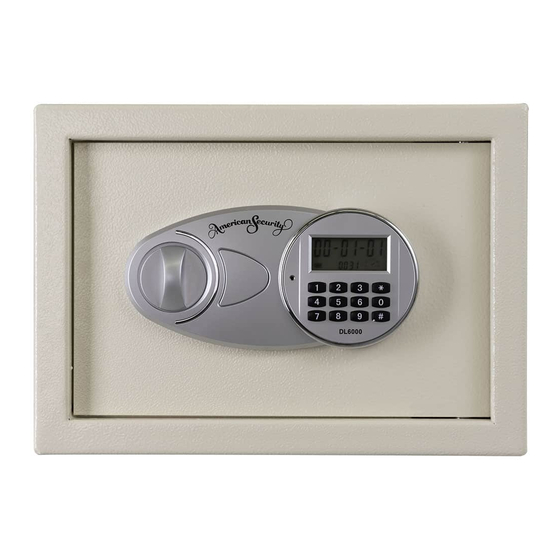AMSEC DL6000 Manual - Page 3
Browse online or download pdf Manual for Safes AMSEC DL6000. AMSEC DL6000 3 pages.

EMERGENCY OPENING / EMERGENCY BYPASS KEY:
1 There is a key lock located under the Emergency Override Cover (6). Press and turn the Emergency Override Cover to the open
position. Cover will pop out.
2 Insert the tubular key provided with the safe and turn clockwise (right).
3 Turn the Knob or Handle clockwise (Right) and open door.
NOTE: If the keys are lost, the key number is stamped on the key and on the front of the cylinder. Make sure to log the key
number with your personal combination and store in a safe place.
BATTERY OVERRIDE:
1 If the LCD display reads "Lo-BATTE" when opening the safe, it means the batteries are low and should be replaced. The battery
tab will also decrease.
2 With the safe open slide the battery cover (10) (located on the back of the safe door) to the left and remove.
3 Replace the batteries with a good brand of Alkaline battery. The LCD display will turn Blue and show GOOD. Be sure and
place the (+) end of the battery in each position of the base as indicated by the symbol.
4 Once the batteries are removed, the user code will default back to original factory code (1,2,3,4) if not replaced within 10
minutes. Reset the user code as stated under Enrolling procedures.
5 If batteries are drained and will not power up the lock, install 4 new AA (1.5 volt) batteries into the "Power Override Box"
supplied with the safe.
6 Plug the Power Override Jack into the Power Override Port located on the bottom of the keypad.
7 Open the safe by following Step 1 and install new batteries as instructed above.
CAUTION FIRE SAFE CONTENT STORAGE
A fire safe contains insulation material, which may cause humidity to be present when closed extended periods of time. It is
recommended that the safe is opened on a regular basis and interior allowed to air out. It is also recommended that documents
sensitive to moisture be kept in a sealed container, I.E Ziplock® or Tupperware®.
MAINTENANCE
Standard Textured finish: Your safe is provided with a durable paint that may be easily cleaned with a mild detergent and a soft
cloth. Do Not use abrasive scouring pads or any chemical fluids, which may react and damage the finish.
Door Operating Mechanism: The handle of the safe moves mechanical parts inside the door. After a period of use, if difficulty is
experienced in operation, please contact a qualified
locksmith for service.
Door Hinges: If the door becomes hard to open or emits noise, the hinges may need
lubrication. Please contact a qualified locksmith for service.
Caution: AMSEC assumes no liability for finish damage due to the incorrect use of caustic lubricants.
DAMAGE CLAIMS
Freight Damage: All safes are carefully packed for shipment. The manufacturer's liability ceases when the transportation
carrier accepts the shipment in good condition. The carrier's liability ceases when you sign for the merchandise. INSPECT YOUR
SHIPMENT BEFORE SIGNING THE DELIVERY RECEIPT. Although unlikely, if damage occurs you have the option of refusing the
shipment or negotiating a settlement with the carrier. To negotiate a settlement follow these steps:
1. Note the extent of the damage on the freight bill and sign your name.
2. Save all cartons and packaging materials.
3. Call the freight carrier immediately and request a damage inspection claim.
All Claims:
1. Contact your dealer immediately.
2. Claims must be filed within 15 days.
3. Claims must be accompanied by proof of purchase receipt and photographs.
4. In the event of replacement, the safe must be returned to the dealer/factory in the original packaging.
This safe must be bolted down using the supplied anchor kit to provide the intended level of security.
IMPORTANT NOTICE
«
Liquids can damage the keypad
CAUTION!
